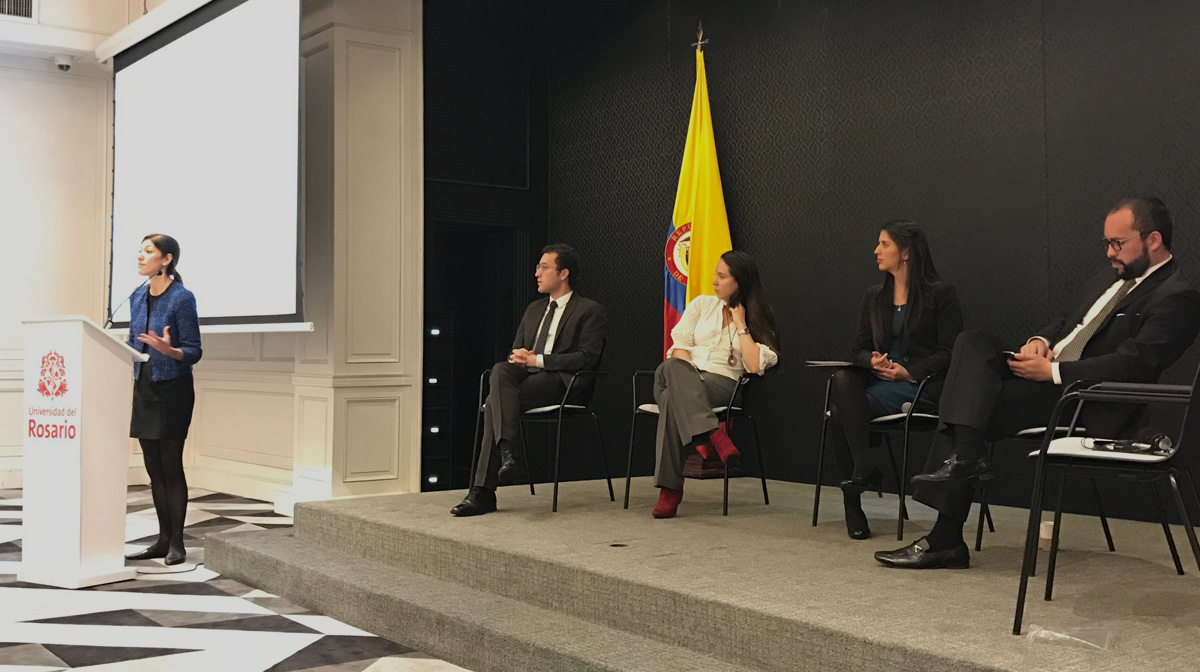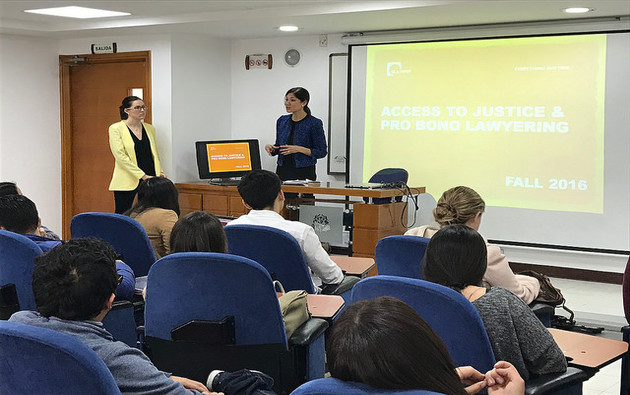Spreading the Word: Teaching on Pro Bono and Access to Justice in Colombia

Posted on 8 May 2017 by Suzanna Brickman
In Fall 2016, I had the privilege of traveling to Bogota, Colombia to work with two longstanding New Perimeter project partners, the Universidad del Rosario and Fundacion Pro Bono Colombia. The experience was enriching and enlightening.
The purpose of my visit was to teach law students about the access to justice crisis, public interest lawyering, and how lawyers in the US – and across DLA Piper – are using pro bono to help close the justice gap. This project advances several New Perimeter goals – to spread pro bono globally, promote access to justice, and help build sound legal institutions.
I taught several classes at the Universidad del Rosario. I first met with admitted students deciding between universities. It was wonderful to discuss, along with Universidad del Rosario professors and alumni, the university’s focus on public interest and human rights, marked by its strong partnership with Fundacion Pro Bono Colombia (the primary pro bono clearinghouse and thought leader in the country). I also met with mid-level law students contemplating where and how to get practical legal training, and with senior students interested in the intersection between lawyering and social responsibility. It was invigorating to be around students and faculty committed to using their law degrees to better their communities, their country, and the world – and as I am a pro bono lawyer myself, working both domestically and internationally, it was an important reminder that social justice and ethical callings (which draw many people to law) transcend borders.
I also visited the Universidad Javeriano, one of Fundacion Pro Bono’s newer partners, where I taught mid-level students considering where to accept legal internships. I spoke on pro bono practice in the U.S., and about the intersection between private practice and public interest law. Though many of the students in the class were aspiring corporate lawyers, they walked away understanding that pro bono is, in fact, a critical component—and business and social imperative—of a commercial practice. As we often remind lawyers in the U.S., pro bono is not just good for the people you serve, it is also good for business!
The trip to Bogota was personally rewarding. I reconnected with Maria Jose Rocha, a recent Colombian law graduate with whom I worked in Washington DC last summer. I was heartened to hear that she remains committed to human rights and pro bono work, even as she embarks on her new career at one of Colombia’s top law firms. I met another former DLA Piper intern; she too incorporates pro bono into her practice as an in-house lawyer at an international company. I got to know the clinical faculty at the Universidad del Rosario, the leaders at Fundacion Pro Bono Colombia, and Colombian lawyers who are driving the country’s emerging pro bono culture. These people are the pioneers of pro bono in Colombia, and it was wonderful to hear about all of the inspiring work that they are doing – such as involving students in a variety of robust clinics, establishing pro bono internships at law firms, and centralizing pro bono opportunities to help grow the pro bono programs at Colombian firms.
And I had the good fortune to spend time with the lawyers at DLA Piper Martinez Beltran, located in the heart of Bogota. My Colombian colleagues co-taught several classes with me and they were gracious hosts. I learned about the impactful pro bono work that the Bogota office is doing – from individual representations to working with grassroots community organizations. Spending time at DLA Piper Martinez Beltran was a warm reminder that DLA Piper’s global footprint means that I have a home in so many cities across the world, where I can find like-minded, committed, and engaged lawyers.
Although I traveled to Colombia with a mission to teach, I left with more knowledge and understanding than I could have imagined. I was reminded that while pro bono culture and practice is thriving in the U.S., we have a long way to go to ensure access to justice for all, such as guaranteeing the right to counsel in civil cases (a right that exists in Colombia), and that we have much to learn from lawyers and legal systems around the world. I was also reminded that there is a common characteristic that so many aspiring lawyers – across the globe – share: the desire to change the world by fighting for justice and equality. I am hopeful that the future lawyers with whom I met understand that no matter the direction of a lawyer’s practice or career path, there is always room, and the need, for the provision of free legal services to those who cannot pay.

Suzanna addresses students at Universidad del Rosario